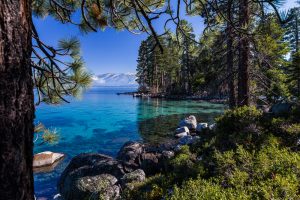
There’s no question that this winter was one for the records. From all the calls we received about how to shovel snow from a roof to the intricate engineering and architectural design one needs for higher elevation homes, we will remember this one for a long time to come.
While we were caring for our clients and shoveling our own driveways, Lake Tahoe was experiencing an unusual winter as well.
This past month, the Tahoe Environmental Research Center (TERC) shared the news that Lake Tahoe had actually ‘flipped’ or mixed vertically from top to bottom. According to the experts at TERC, most years, the mixing does not extend beyond 1,000 feet.
Full mixing is an annual event in shallower lakes, however for Lake Tahoe and its 1,640-foot depth, it is a less common occurrence. Lake Tahoe last mixed during the 2018-19 winter. Typically mixing starts in the fall, with the surface layer of the lake cooling and gradually mixing deeper. Most years, the mixing does not extend beyond 1,000 feet.
What causes the mixing? TERC explained that the air temperature is the largest factor, not the intensity of individual storms. As this has been a particularly cold winter, it caused the Lake to mix deeper and weeks earlier compared to most other years.
So, is that a good thing? Yes. They told us that lake mixing is extremely good as it renews the water at the Lake bottom with “fresh” oxygen-rich water from the surface.
As we wrap up this ski season and winter to remember, we thank all the unsung heroes who kept the roads clear, our utilities intact and businesses running throughout it all!
 James P. Borelli
James P. Borelli
Founder/Principal
Borelli Architecture
Lake Tahoe / Truckee
jim@borelliarchitecture.com
775.831.3060
